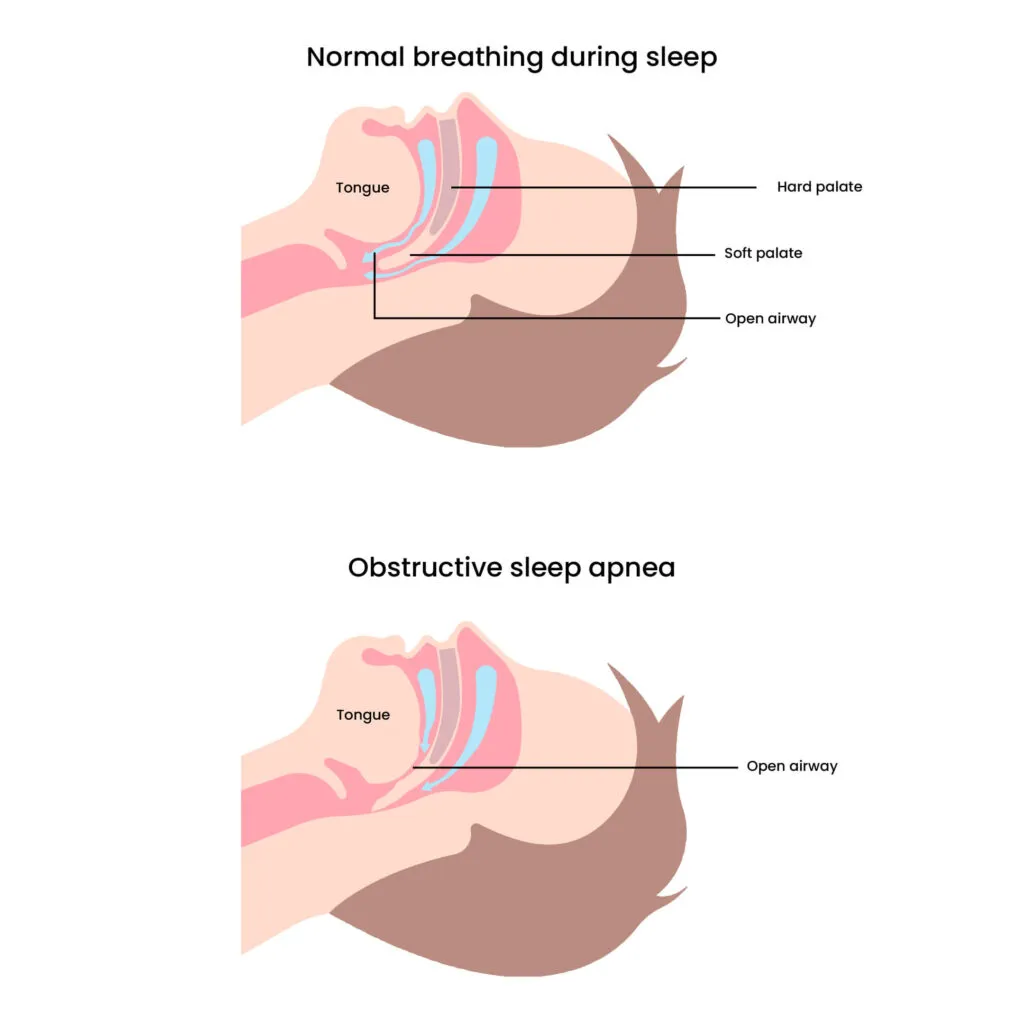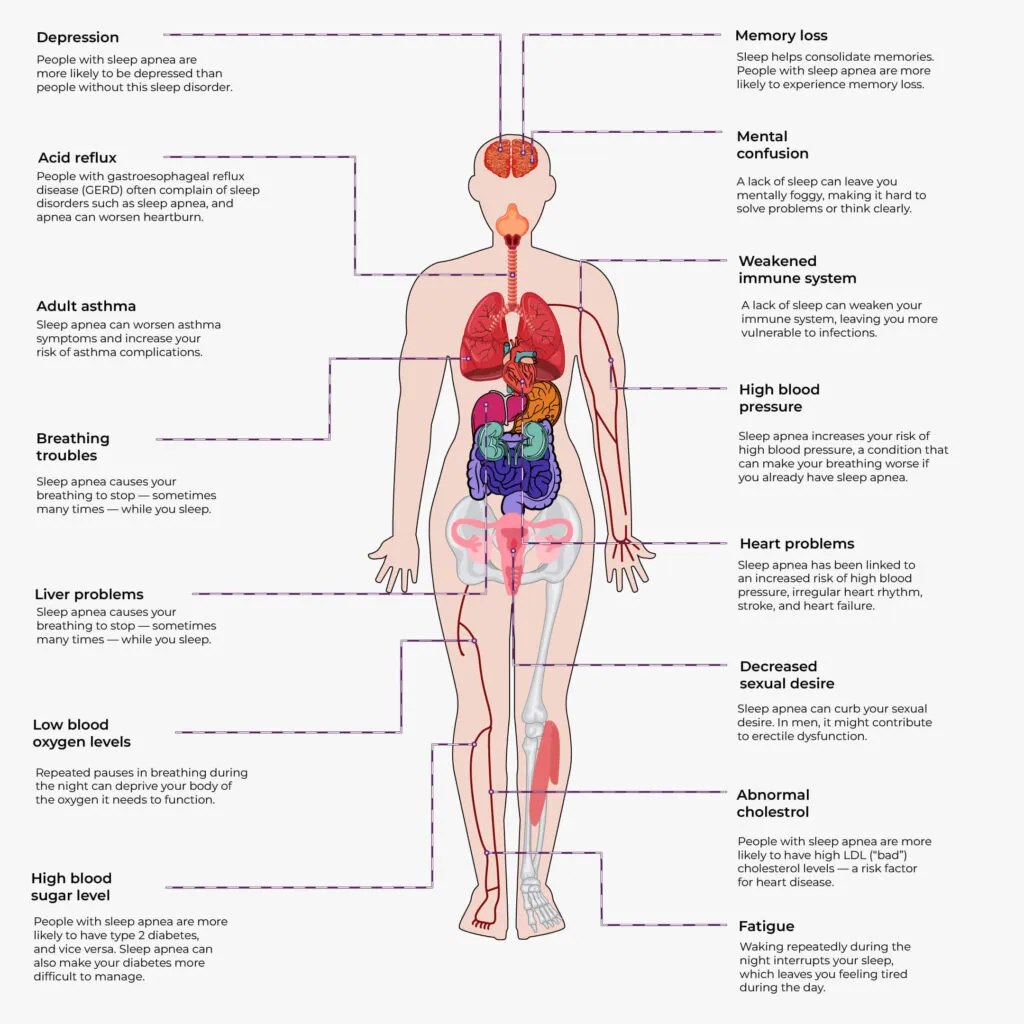At the end of a hectic day, we all look forward to heading back home to our bed and getting a good night’s sleep. Well, why not! A good night’s sleep is like a reboot button that ensures our mind, body, and soul are adequately rested and we wake up fresh and rejuvenated the following day. But not everyone is blessed to have a good night’s sleep. Besides insomnia, another condition linked to poor sleep and an increased risk of health complications is sleep apnea. Did you know snoring, a simple yet annoying habit many people have, maybe a sign of sleep apnea? This article attempts to answer the question, “Can sleep apnea lead to brain damage?”
Did You Know? Your ancestry test DNA data includes 700,000 markers, which can be used to learn everything from disease risk and drug sensitivities to nutritional requirements and fitness parameters. Learn more.
What Is Sleep Apnea?
Sleep apnea is a medical condition that causes interrupted breathing during sleep.
Obstructive sleep apnea (OSA) is the most common type of sleep apnea, which occurs when something blocks the airway temporarily or permanently during sleep.
Sleep apnea is characterized by paused or shallow breathing during sleep.
This results in low levels of oxygen in the blood during sleep time.
Untreated sleep apnea has been linked to stroke, acute coronary syndrome, neurodegenerative disease, obesity, and type 2 diabetes.
Symptoms
Most people with sleep apnea are unaware of their condition.
It is often a partner, spouse, or family member who observes the following signs in an individual with sleep apnea:
- Gasping for breath
- Loud snoring
- Breathing may stop for a while, followed by noisy breath
The individual with sleep apnea may experience the following symptoms:
- Excessive daytime sleepiness
- Headache or dry mouth on waking up
- Irritability
- Difficulty in concentrating
- Insomnia or restless sleep
- Fatigue
Causes and Risk Factors
Causes of Sleep Apnea
Obstruction in the airways that is seen in sleep apnea may occur due to the following:
- Laxity of muscles and other tissues in the throat or mouth
- Nasal congestion
- Thickened tissues or excessive fat deposits in the airways
- Underlying neurological condition
Causes of obstruction mentioned above may occur due to any of the following conditions:
- Cold and allergies
- Obesity
- Thyroid problems
- Kidney or heart failure
- Swollen tonsils
- Genetic factors

Risk factors of Sleep Apnea
Some people are more prone to sleep apnea than others.
A few risk factors of sleep apnea include:
- Obesity
- Sinusitis
- Allergies
- Increased age
- Smoking
- Pregnancy
- Nasal congestion
- Large tonsils
- Family history of sleep apnea
How Does Sleep Apnea Affect The Brain?
While sleep apnea causes symptoms related to breathing and increases the risk of developing various cardiovascular conditions, it also impacts the brain.
Sleep apnea is associated with an increased risk of brain damage.
If uncorrected or untreated in time, sleep apnea may cause emotional dysfunction and cognitive impairments.
People with sleep apnea often have problems with mood and memory.
This happens because sleep apnea affects structures in the brain that regulate memory, mood, and attention.
Some studies state that sleep apnea may reduce the amount of gray matter (the tissue responsible for the brain’s ability to process information).
Here are some ways sleep apnea contributes to brain damage:
Sleep deprivation
Sleep apnea causes periodic breathing interruptions throughout the night.
These pauses in breathing disrupt REM sleep cycles that are important for memory and learning.
Over a period of time, the lack of REM sleep can result in cognitive impairment and memory loss.
Hypoxemia
The interruptions in breathing in people with sleep apnea may cause hypoxemia (low oxygen levels in the blood).
When the brain does not receive an adequate and constant supply of oxygen, it may lead to brain damage and death.
Breakdown of the blood-brain barrier
Studies have shown that untreated obstructive sleep apnea can break down the blood-brain barrier(BBB) (BBB protects the brain tissue from harmful substances).
As a result, the individual is more prone to conditions like stroke, epilepsy, multiple sclerosis, and meningitis.
Can Sleep Apnea Cause Neurological Problems?
The link between sleep apnea and neurological problems is bidirectional.
Research states that individuals with neurological conditions like Parkinson’s, myotonic dystrophy, and myasthenia gravis have a higher chance of sleep apnea.
At the same time, sleep apnea also increases the risk of developing neurological problems.
Recent studies have shown a relationship between OSA and neurological disorders, including neurodegenerative diseases, epilepsy, and stroke.
OSA may also accelerate mild cognitive impairment in Alzheimer’s disease.
Sleep Apnea Could Be Harming Brain Health: A New Study
Study Overview
According to a study published in May 2023 in the journal Neurology, sleep apnea and snoring may harm your brain health.
Researchers found that people with severe sleep apnea have a higher risk of developing brain biomarkers associated with cognitive decline, increased risk of strokes, and Alzheimer’s.
These biomarkers are sensitive signs that indicate early cerebrovascular disease.
Study Participants
The study observed 140 people, with an average age of 72, all of whom had sleep apnea.
Of these participants:
- 34% of them had mild sleep apnea
- 32% of them had moderate sleep apnea
- 34% of them had severe sleep apnea
All the participants were cognitively unimpaired and did not have dementia.
They were subjected to two types of MRI scans.
Study Findings
While observing the brain, researchers found that people with severe sleep apnea had more damage to their white matter than those with deep sleep (also called slow-wave sleep).
The study also highlighted that for every 10% decreased time spent in deep sleep, white matter changes were similar to being 2.3 years older.
The study's co-author, Dr. Carvalho, stated that the association of sleep apnea with brain damage was found to be more in people with a severe form of the condition.
Mild to moderate sleep apnea may not affect white matter in the brain.
Limitations and Future Direction
Further studies are required in this area to assess the causation of these changes.
Other Side Effects Of Obstructive Sleep Apnea

Is Brain Damage Caused By Sleep Apnea Permanent?
Brain damage due to sleep apnea has been well-established.
But is it reversible?
The good news is- Yes, it is!
Continuous positive airway pressure (CPAP) therapy can help reverse the damage to the white and gray matter in individuals with sleep apnea.
How To Reverse Sleep Apnea Brain Damage?
The first choice of treatment for most sleep apnea cases is CPAP therapy.
CPAP Therapy involves the placement of a mask over the nose or nose and mouth while sleeping.
This is done using a continuous positive airway pressure (CPAP) device, which blows pressurized air into the lungs and keeps the airways open during sleep.
Besides relieving sleep apnea symptoms, CPAP therapy has been found to reverse brain damage partially or entirely.
Researchers also found that white matter takes longer to respond to CPAP therapy than gray matter.
Tips To Cope With Sleep Apnea
If you or someone you know is living with sleep apnea, you must get it treated at the earliest.
Here are a few tips that make coping with sleep apnea possible:
- Losing and maintaining weight within the normal range may help with sleep apnea. Losing even a few kilos may significantly improve your symptoms.
- Sleeping on your side helps keep your airways open, thereby reducing the symptom of sleep apnea. People with mild sleep apnea can try this tip.
- Seek medical treatment as the underlying cause must be treated for symptomatic relief in most individuals.
- Avoid alcohol, as it affects the muscle tone of the upper airway and makes your palate floppy. These may aggravate your apnea symptoms.
- Stay hydrated, as people with sleep apnea tend to become dehydrated at night.
Summary: Sleep Apnea Brain Damage
- Besides insomnia, another condition linked to poor sleep and an increased risk of health complications is sleep apnea.
- Sleep apnea is a medical condition that causes interrupted and shallow breathing during sleep.
- Untreated sleep apnea has been linked to stroke, acute coronary syndrome, obesity, type 2 diabetes, and brain damage.
- Obstruction in the airways due to several causes can cause sleep apnea.
- Sleep apnea is associated with an increased risk of brain damage, and if untreated, it can cause emotional dysfunction and cognitive impairments.
- Damage to the white and gray matter in individuals with sleep apnea may be reversed by using continuous positive airway pressure (CPAP) therapy.




